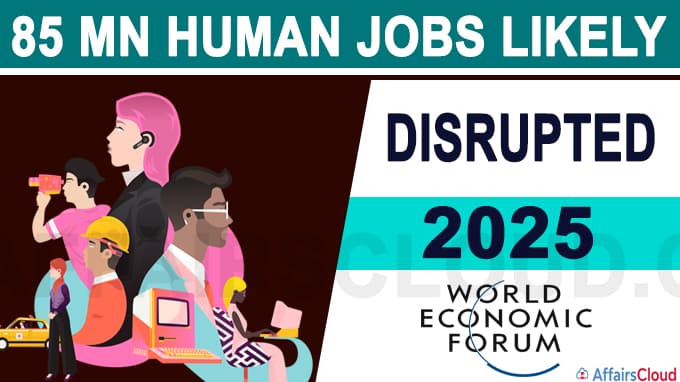 According to the Third Edition of “The Future of Jobs Report 2020” released by the World Economic Forum (WEF), COVID-19 and Technological Advances will disrupt around 85 Million Jobs by 2025.
According to the Third Edition of “The Future of Jobs Report 2020” released by the World Economic Forum (WEF), COVID-19 and Technological Advances will disrupt around 85 Million Jobs by 2025.
The WEF report is based on the Future of Jobs Survey, which is based on projections of senior Business Leaders from 300 Global firms who together employ over a million workers.
Key Points:
i.In the next five years, automation and new division of labour between humans and machines will create disruption of jobs.
ii.Redundant work roles will decline from 15.4 percent of the workforce to 9 per cent.
iii.The pandemic induced economic crisis has accelerated the disruption of jobs.
iv.The report also points out that
- 43 per cent of Businesses are set to reduce their workforce due to technology integration
- 41 percent will expand their use of contractors for task-specialised work
- 34 percent plan to expand their workforce due to technology integration.
v.The report also highlights that 50 percent of the workers require re-skilling to remain in their jobs for the next five years.
97 Million New Jobs in New Labour Market:
i.The report found that 97 Million New Jobs may emerge in the New Labour Market consisting of division of labour between humans, machines and algorithms.
ii.The acceleration of technology is set to increase the Global Inequality, and low-income workers, young people, women and low-skilled workers will be most affected.
Suggestions from Report:
i.The report suggested governments provide displaced workers with access to social safety nets, improve education and offer incentives for businesses to invest in jobs of the future.
ii.It urged the private sector to set benchmarks, training programmes and targets to ensure that workers are not left behind.
Antivirals, Spaceflights, hyperloops among 20 markets to transform Economy:
i.WEF released a white paper on ‘20 markets of tomorrow’ which will transform the Economies in an inclusive and sustainable way during the Jobs Reset Summit 2020.
ii.‘20 Markets of Tomorrow’ includes antivirals, spaceflights, skills capital, water rights and quality credits, genes and DNA sequences, precision medicines and orphan drugs, ed-tech and reskilling services, artificial intelligence, satellite services, greenhouse gas allowances, reforestation services, and hydrogen.
iii.Besides the list, electric vehicles, plastics recycling, care, data, digital financial services, hyperloop-based transport services, new antibiotics, unemployment insurance have been included in the list.
India named among countries with Solid Technological Systems for a transformation:
i.India has been named among the countries that present solid technological systems for such a transformation.
ii.However, India needs development in social and institutional fabric to deliver in these markets.
iii.Czech Republic, Israel, Italy, Japan, Spain, Hungary, Poland and BRIC countries (Brazil, Russia, India and China) have been named among the countries with the potential for such transformations.
Recent Related News:
i.From September 21—24, 2020, the World Economic Forum’s fourth and first fully virtual Sustainable Development Impact Summit 2020 was held under the banner “Realizing a Great Reset for Sustainable Development”
ii.On May 13, 2020 According to the World Economic Forum(WEF)’s global Energy Transition Index(ETI) 2020, India ranked 74th with a score of 51.5%.
About World Economic Forum (WEF):
Founder, Executive Chairman – Klaus Schwab
Headquarters – Geneva, Switzerland




